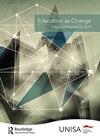“Only What’s Right”: Normalising Children’s Gender Discourses in Kindergarten (The Case of Montenegro)
IF 1
4区 教育学
Q3 EDUCATION & EDUCATIONAL RESEARCH
引用次数: 0
Abstract
This article presents results from qualitative research on children’s dominant gender discourses in kindergarten and the influence of the socio-pedagogical aspects of kindergarten culture, transmitted via teachers’ gender discourses and personal epistemologies, on the construction of children’s gender discourses and identities. The main questions guiding our research were: What gender stories are narrated in a group, and under which influences do these stories become established as norms? Our understanding of gender is based on the feminist poststructuralist perspective. Our research in two Montenegrin kindergartens with 54 children and four teachers during a two-week period showed a dominance of the binary opposition discourse of “hegemonic masculinity” and “emphasised femininity”, with an emphasis on gender-stereotyped toys, games, role-play, and professions. Additionally, it has been found that the kindergarten culture strongly shapes and “normalises” children’s perception of “right” gender practices, by reflecting and mirroring teachers’ gender-typed expectations and a value system based on an objectivist personal epistemology that implicitly promotes “feminine” values of subordination, peace, silence and obedience. The findings suggest the need for research focusing particularly on the relationship between teachers’ epistemological theories and the dominant gender discourses in kindergarten. It is also recommended that Montenegro’s early childhood education policy and strategy documents consider and elaborate more thoroughly the concept of gender identity and gender-flexible pedagogies.“只有正确的”:幼儿园儿童性别话语的规范化(以黑山为例)
本文介绍了对幼儿园儿童主导性别话语的定性研究结果,以及通过教师性别话语和个人认识论传播的幼儿园文化的社会教育方面对儿童性别话语和身份建构的影响。指导我们研究的主要问题是:在一个群体中讲述什么样的性别故事,这些故事在什么影响下成为规范?我们对性别的理解是基于女性主义后结构主义的视角。我们对黑山两所幼儿园的54名儿童和4名教师进行了为期两周的研究,结果显示,“霸权男性气质”和“强调女性气质”的二元对立话语占主导地位,强调性别刻板印象的玩具、游戏、角色扮演和职业。此外,研究发现,幼儿园文化通过反映和镜像教师的性别类型期望和基于客观主义个人认识论的价值体系,强烈地塑造和“规范”了儿童对“正确”性别实践的感知,这种认识论隐含地促进了服从、和平、沉默和服从的“女性”价值观。研究结果表明,需要特别关注教师认识论理论与幼儿园中占主导地位的性别话语之间的关系。还建议黑山的幼儿教育政策和战略文件更彻底地考虑和阐述性别认同和性别灵活教学法的概念。
本文章由计算机程序翻译,如有差异,请以英文原文为准。
求助全文
约1分钟内获得全文
求助全文
来源期刊

Education As Change
EDUCATION & EDUCATIONAL RESEARCH-
CiteScore
1.40
自引率
0.00%
发文量
29
审稿时长
24 weeks
期刊介绍:
Education as Change is an accredited, peer reviewed scholarly online journal that publishes original articles reflecting critically on issues of equality in education and on the ways in which educational practices contribute to transformation in non-formal, formal and informal contexts. Critique, mainly understood in the tradition of critical pedagogies, is a constructive process which contributes towards a better world. Contributions from and about marginalised communities and from different knowledge traditions are encouraged. The articles could draw on any rigorous research methodology, as well as transdisciplinary approaches. Research of a very specialised or technical nature should be framed within relevant discourses. While specialised kinds of research are encouraged, authors are expected to write for a broader audience of educational researchers and practitioners without losing conceptual and theoretical depth and rigour. All sectors of education are covered in the journal. These include primary, secondary and tertiary education, adult education, worker education, educational policy and teacher education.
 求助内容:
求助内容: 应助结果提醒方式:
应助结果提醒方式:


